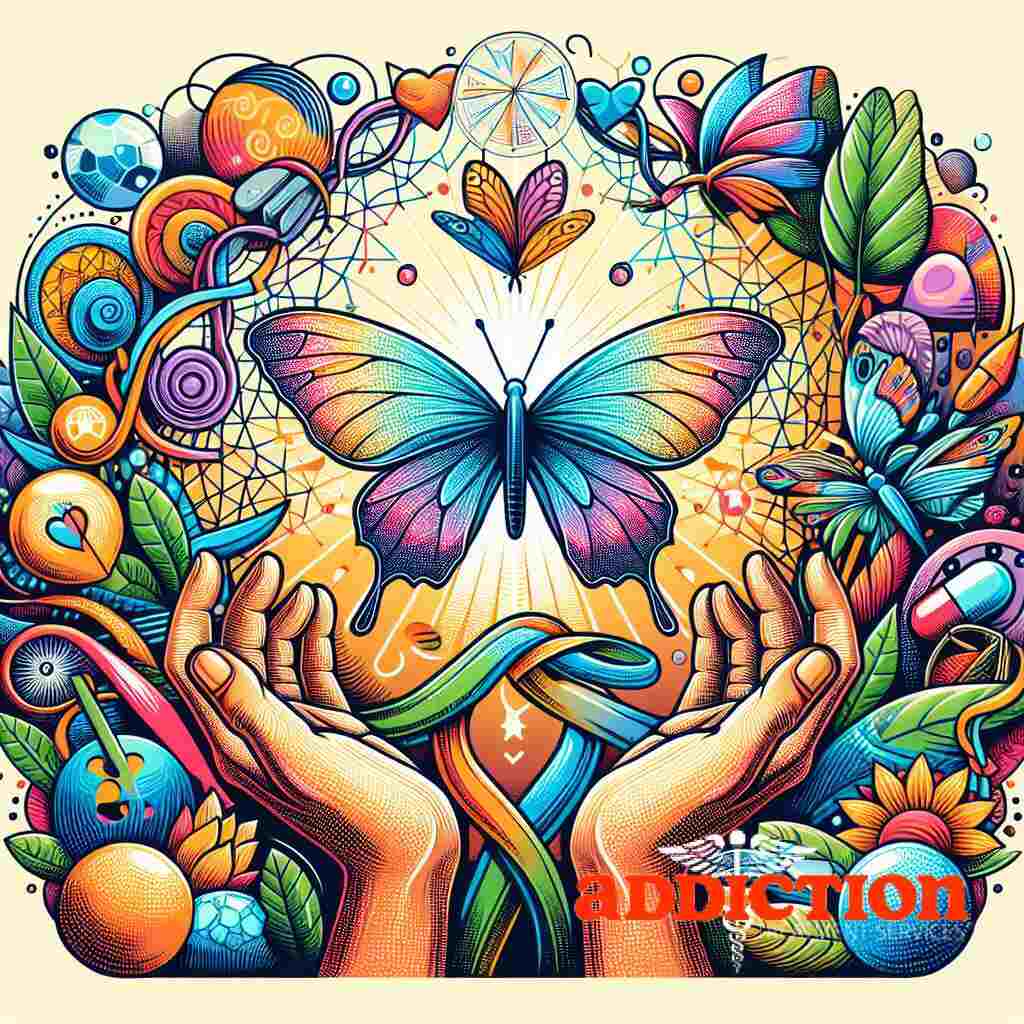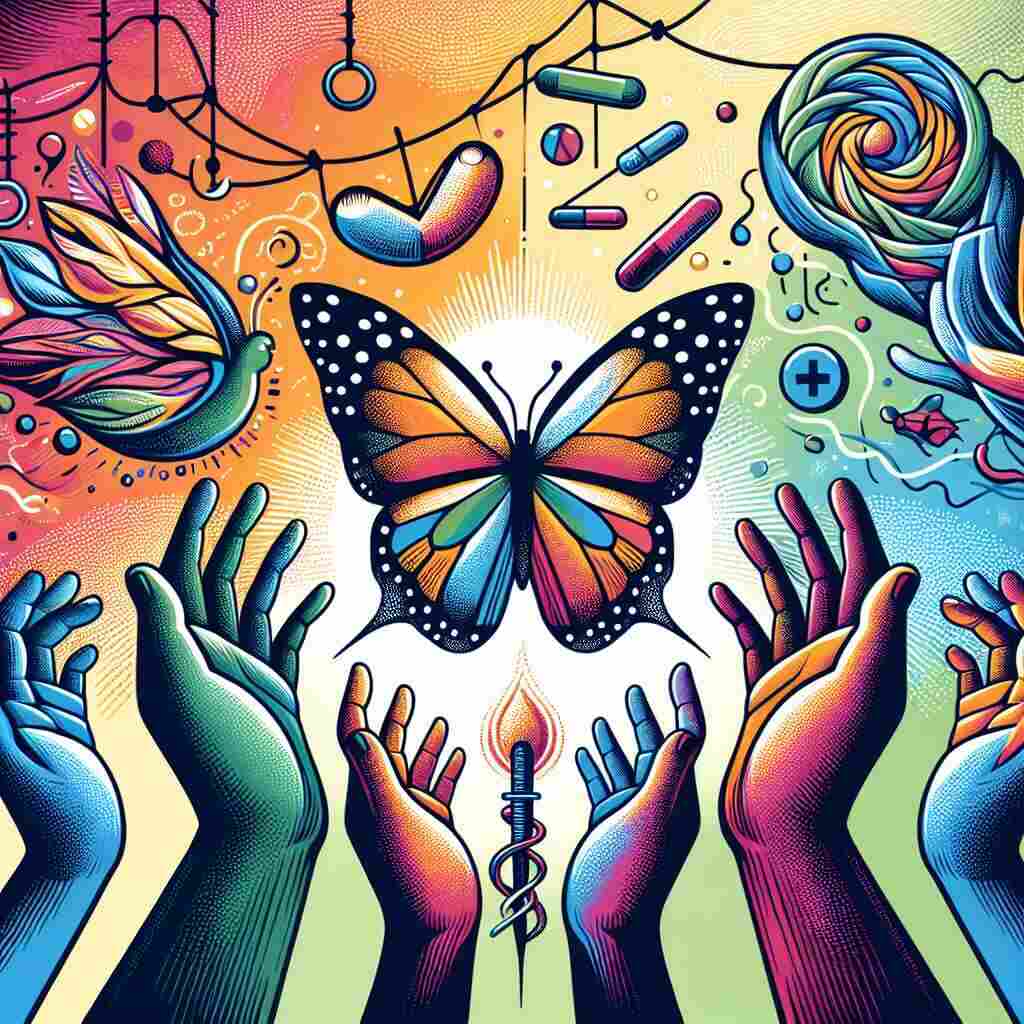 Posted On: 02/28/2024
Posted On: 02/28/2024Understanding the Journey to Recovery
Defining Substance Use Disorders
Substance Use Disorders (SUDs) are complex conditions where the use of one or more substances leads to a clinically significant impairment or distress. These disorders span a wide range, including dependencies on alcohol, prescription drugs, and illicit substances. A hallmark of substance use disorders is the continuation of substance use despite the harmful consequences it brings to the user’s physical health, mental state, and interpersonal relationships. The road to recovery begins with understanding the nature of these disorders, recognizing the powerful grip they can have on individuals, and acknowledging the need for comprehensive addiction treatment services to address both the physical and psychological dimensions of addiction.
The Impact of Addiction on Individuals and Families
Addiction reaches far beyond the individual, casting a shadow over families and communities. It disrupts family dynamics, strains relationships, and places an emotional and financial burden on loved ones. Children growing up in environments where substance misuse is prevalent are at a higher risk of developing emotional problems and engaging in substance use themselves. Furthermore, addiction can lead to legal and employment issues, contributing to a cycle of poverty and dependency. This broad impact underscores the importance of family involvement in the recovery process, as well as the need for integrating behavioral health services with addiction recovery to address the multifaceted nature of substance abuse.
The Importance of Recognizing the Need for Help
The first, and often most challenging, step in the journey to recovery is recognizing the need for help. Many individuals with substance use disorders live in denial or fear the stigma associated with addiction, which can delay or prevent them from seeking treatment. Acknowledging the problem allows individuals to take a critical step forward toward rehabilitation. Early intervention in addiction can significantly enhance the effectiveness of treatment programs for substance abuse, potentially reducing the severity of withdrawal symptoms and increasing the chances of long-term recovery. Resources such as Addiction Treatment Services offer a lifeline to those seeking help, providing a comprehensive directory of addiction treatment centers and recovery services. Whether the path to recovery involves drug rehabilitation, medication-assisted treatment, or holistic addiction care, the key is taking that first step and reaching out for the support that can guide individuals through their recovery journey.
First Steps Toward Recovery

Early Intervention in Addiction
Early intervention in addiction plays a critical role in minimizing the long-term negative impacts of substance abuse on an individual’s life. It entails recognizing the signs of substance misuse at an initial stage and taking proactive steps to seek help. Studies have shown that early intervention can dramatically improve the outcome of addiction treatment, leading to higher success rates in long-term recovery. Addiction Treatment Services emphasizes the need for awareness and education on the importance of early detection of substance use disorders. These efforts can greatly reduce the progression of addiction and the severity of withdrawal symptoms, making the recovery process more manageable for individuals. Highlighting the significance of early intervention, resources like addiction treatment services near you provide a pivotal first step in accessing the necessary support and information for individuals and their families.
Comprehensive Assessment and Personalized Treatment Plans
The journey to recovery from substance abuse begins with a comprehensive assessment by addiction treatment centers. This in-depth evaluation covers various aspects of an individual’s physical health, mental health, substance use history, and social circumstances. The purpose is to gather all necessary information to create a personalized treatment plan tailored to the unique needs of the client. Addiction Treatment Services facilitates access to reputable treatment facilities that prioritize a holistic approach to recovery. These centers employ a multidisciplinary team of healthcare professionals who collaboratively work to address not only the symptoms of addiction but also the underlying causes. Whether the treatment plan involves medication-assisted treatment, an intensive outpatient program, or residential care, the goal is to offer a pathway that best suits the individual’s recovery needs. Personalized treatment plans are essential for effective recovery, as they ensure that each person receives the specific type of support and treatment required for their situation.
Engaging Family Members in the Recovery Process
Content: Family involvement in the recovery process is a cornerstone of successful outcomes in addiction treatment. Substance abuse not only affects the person struggling with addiction but also has a profound impact on their family members. Addiction Treatment Services advocates for the inclusion of family education and support programs as integral components of addiction recovery programs. Engaging family members offers numerous benefits, including improved communication, healing of relationships damaged by substance misuse, and creating a supportive environment conducive to recovery. Family therapy sessions, educational workshops, and support groups are examples of how families can become actively involved in the recovery journey. By understanding the dynamics of addiction, families can learn effective ways to support their loved one while also taking care of their own well-being. Encouraging family involvement demonstrates the holistic approach to addiction recovery, acknowledging the importance of a supportive network in facilitating long-term success in overcoming substance use disorders.
Exploring Treatment Options
Overview of Addiction Treatment Services
At the heart of a successful recovery journey lies the understanding and utilization of various addiction treatment services. These services offer a broad spectrum of care options, designed to address the individualized needs of those battling substance use disorders. From initial assessment and detoxification to ongoing support and relapse prevention, addiction treatment centers across the 50 US states strive to provide a comprehensive pathway to recovery. Addiction Treatment Services serves as a crucial online resource, guiding individuals to local, reputable treatment options tailored to their unique circumstances. Whether the need is for a sober house environment, intensive outpatient care, or residential treatment, our platform ensures that individuals and their families can make informed decisions about the care they need. With a focus on both physical and mental healing, addiction recovery services encompass a range of therapeutic options including psychotherapy, medication-assisted treatment, and holistic addiction care.
Difference Between Outpatient and Residential Treatment Facilities
Choosing between outpatient and residential treatment facilities is a significant decision that directly impacts the recovery journey. Residential treatment, or inpatient care, offers a structured and immersive environment where individuals live at the treatment facility throughout their recovery process. This option is particularly beneficial for those with severe substance use disorders or those needing a safe and supportive space to begin their recovery. Residential treatment provides around-the-clock care and access to medical and therapeutic support, facilitating a focused and uninterrupted path to sobriety.
On the other hand, outpatient treatment allows individuals to live at home while attending scheduled treatment sessions. This option can be especially advantageous for those with obligations that cannot be put on hold, such as work, school, or family care. Outpatient care offers flexible scheduling and varying levels of intensity, from weekly therapy sessions to day programs. Both types of facilities aim to equip individuals with the tools and strategies for managing addiction, yet the choice between them depends on the severity of addiction, personal circumstances, and specific recovery needs.
The Role of Detoxification in Substance Abuse Recovery
Detoxification is a vital first step in the continuum of addiction recovery services, designed to safely manage the acute physical symptoms of withdrawal from substance use. The detox process serves to cleanse the body of toxins accumulated through prolonged substance abuse, setting the stage for effective therapeutic intervention. Depending on the substance and the severity of the addiction, withdrawal symptoms can range from mild to life-threatening. Hence, detoxification often takes place under medical supervision, either within specialized detox centers or as part of residential treatment programs, ensuring that individuals receive the necessary care and support during this challenging phase.
Detoxification alone, however, is not a cure for addiction, it is the prerequisite for deeper therapeutic work that addresses the psychological aspects of substance use disorders. Following detox, an individualized treatment plan-which may include participation in Alcoholics Anonymous meetings, psychotherapy, and holistic addiction care-aims to tackle the root causes of addiction, promote behavioral change, and sustain long-term recovery. The strategic role of detoxification within the broader recovery journey underscores the importance of accessing reputable addiction treatment centers that offer medically supervised detoxification services as part of a comprehensive, multi-faceted approach to addiction recovery.
Innovations in Treatment: Medication-Assisted Treatment
Understanding Medication-Assisted Treatment
Medication-Assisted Treatment (MAT) represents a groundbreaking approach in the field of addiction recovery, particularly for individuals dealing with opioid and alcohol use disorders. This method combines medications, such as buprenorphine, methadone, and naltrexone, with comprehensive behavioral therapies to create a dual-focused treatment strategy. The principle behind MAT is to alleviate withdrawal symptoms and cravings that are central to addiction, making it easier for patients to engage in psychotherapy and other recovery activities. MAT has been scientifically proven to enhance patient survival rates, increase retention in treatment programs, and decrease the likelihood of engaging in illicit activities associated with substance use. Despite its effectiveness, MAT is vastly underutilized, often due to misconceptions about replacing one drug with another. However, when properly administered, MAT is a critical tool in overcoming the physiological barriers to recovery, offering a bridge to a more sustainable, substance-free lifestyle.
Benefits of Medication-Assisted Treatment for Substance Use Disorders
The integration of Medication-Assisted Treatment in addiction recovery services brings myriad benefits that can significantly alter the trajectory of an individual’s recovery journey. First and foremost, MAT has been shown to reduce the mortality rate associated with opioid overdose by providing controlled medications that lessen the impact of withdrawal symptoms without inducing the euphoric effects associated with opioid abuse. Furthermore, MAT can improve an individual’s ability to maintain employment and participate in societal roles, thus fostering a sense of purpose and motivation for recovery. From a physiological standpoint, these medications can normalize brain chemistry, block the euphoric effects of alcohol and opioids, relieve physiological cravings, and stabilize body functions, giving patients a fair chance at recovery. For those battling severe addiction, MAT can be the difference between a relentless cycle of relapse and a path to healing, validating its position as a cornerstone in modern addiction treatment services.
Integrating Medication-Assisted Treatment with Traditional Therapies
For a comprehensive approach to recovery, Medication-Assisted Treatment must be seamlessly woven into traditional therapeutic models, such as psychotherapy, cognitive-behavioral therapy, and group counseling. This integration allows for a holistic treatment plan that addresses both the biological and psychological facets of addiction. Addiction Treatment Services advocates for using MAT as a component of a broader recovery strategy, where medication stabilizes the patient’s physiological state, enabling more productive counseling sessions. As patients progress, the focus can gradually shift towards deeper psychotherapeutic work, coping strategies, and life skill development. This balanced approach ensures that while the medication mitigates the immediate hurdles of addiction, therapy addresses the underlying causes, preparing individuals for a sustained recovery. The success of integrating MAT with traditional therapies underscores the importance of a personalized treatment plan, acknowledging that recovery is a multifaceted process requiring both medical and emotional support.
The Comprehensive Approach to Recovery
Combining Behavioral Health Services with Addiction Recovery
The integration of behavioral health services with addiction recovery redefines the path to holistic healing for individuals facing substance use disorders. This synergistic approach acknowledges that addiction often coexists with mental health issues such as depression, anxiety, and PTSD, making a concurrent treatment model essential for addressing the complexities of each individual’s situation. Addiction Treatment Services emphasizes the importance of this combination, offering access to treatment facilities that specialize in providing both mental health services and addiction recovery programs under one roof. By doing so, individuals receive not only the targeted addiction treatment necessary for overcoming substance misuse but also the mental health support crucial for addressing underlying psychological issues. This dual approach ensures a more comprehensive recovery process, preparing individuals for a healthier, substance-free lifestyle while mitigating the risk of relapse caused by untreated mental health conditions.
Mental Health and Substance Use Disorder: The Dual Diagnosis Treatment
The intersection of mental health issues and substance use disorders presents a unique challenge that requires specialized treatment known as Dual Diagnosis Treatment. This approach addresses the intertwined nature of mental health disorders and addiction, recognizing that one can often exacerbate the other. Addiction Treatment Services connects individuals with Dual Diagnosis Treatment, ensuring they receive care that’s tailored to their specific needs. For instance, someone battling anxiety may turn to alcohol as a form of self-medication, leading to an addiction that complicates their mental health further. Dual Diagnosis Treatment aims to break this cycle by treating both the underlying mental health condition and the substance use disorder concurrently, facilitating a more effective and lasting recovery. By addressing both conditions simultaneously, the treatment reduces the likelihood of relapse, enhances the quality of life, and promotes sustained wellness.
Relapse Prevention Strategies for Sustainable Recovery
Sustainable recovery from substance abuse is not just about overcoming physical dependence, it’s also about equipping individuals with the tools and strategies necessary to prevent relapse in the long term. Relapse Prevention Strategies play a pivotal role in this aspect of recovery, helping individuals recognize and manage triggers, cope with stress without turning to substances, and build a supportive network that encourages ongoing sobriety. Addiction Treatment Services emphasizes the importance of incorporating these strategies into treatment plans, offering guidance on creating personalized relapse prevention plans that cater to an individual’s unique circumstances and challenges. Such plans often include ongoing therapy, engagement in support groups like Alcoholics Anonymous, lifestyle adjustments, and sometimes, continued medication-assisted treatment. By prioritizing relapse prevention, individuals can navigate life after treatment with confidence, knowing they possess the skills to maintain their recovery and confront challenges without reverting to substance use.
Support Beyond the Treatment Program
The Vital Role of Recovery Support Services
Recovery from substance use disorders is an ongoing journey, extending far beyond the initial treatment program. Recovery support services play a crucial role in this extended journey, providing individuals with the tools and resources necessary to maintain their sobriety in everyday life. These services can range from peer support groups and 12-step programs to sober living environments and ongoing counseling. By staying connected with addiction recovery services, individuals can continually reinforce their commitment to sobriety, confront challenges with confidence, and cultivate a lifestyle that supports long-term recovery. This support network is vital for navigating the inevitable ups and downs post-treatment, ensuring that individuals never have to face their journey alone. Engaging with recovery support services empowers individuals to build resilience against relapse, creating a strong foundation for a substance-free future.
Building a Supportive Community for Ongoing Recovery
Cultivating a supportive community is fundamental to successful, long-term recovery. This community often includes family, friends, recovery peers, and professionals who provide encouragement, understanding, and accountability. Participation in community support initiatives, such as local recovery groups or Alcoholics Anonymous meetings, fosters a sense of belonging and offers individuals the chance to share their experiences with others who have faced similar challenges. Moreover, involvement in such communities provides valuable insights into effective coping strategies and opens up avenues for giving back by supporting others in their recovery journey. Building a supportive community offers a critical source of strength and encouragement, reminding individuals that they are part of a collective effort aimed at overcoming addiction and achieving long-term wellness.
Leveraging Technology for Recovery Support
In the modern digital age, technology has become an invaluable tool for extending the reach and efficacy of addiction recovery support services. A myriad of apps, online support groups, and telehealth services are available to individuals seeking to maintain their recovery journey from the comfort of their homes. These technological solutions offer convenient access to counseling sessions, peer support forums, and resources such as motivational content, educational material on substance misuse, and relapse prevention strategies. The incorporation of technology in recovery support enables individuals to stay connected with their support network, access help whenever needed, and take proactive steps toward sobriety with a wide array of digital resources at their fingertips. As these digital platforms continue to evolve, they offer promising avenues for enhancing the recovery experience, providing flexible, immediate support that complements traditional addiction treatment services and empowers individuals in their pursuit of long-term recovery.
Managing Challenges and Setbacks
Coping with Withdrawal Symptoms
Withdrawal symptoms are often the first formidable challenge faced during the recovery process. These symptoms can range from mild discomfort, like headaches and irritability, to severe physical and psychological disorders, including seizures and depression. Successfully managing these symptoms is pivotal, as it sets the tone for the entirety of the recovery journey. Treatment facilities emphasize the importance of medically supervised detoxification services as a means to safely navigate withdrawal. This approach, coupled with support from addiction recovery services, offers individuals a solid foundation from which they can embark on their rehabilitation with confidence. Education about the nature and management of withdrawal symptoms is also essential, as it prepares individuals and their families for the realities of the detoxification process.
Dealing with Relapses: A Step Toward Long-Term Recovery
Relapses are not uncommon in the journey toward recovery and should not be viewed as failures but rather as opportunities for learning and growth. Addiction treatment services play a crucial role in framing relapses as part of the recovery process, providing the necessary support to help individuals regain their footing. A relapse can signify the need for adjustments in one’s treatment plan, indicating areas that require additional focus or alternative strategies. Treatment programs for substance abuse often include comprehensive relapse prevention plans, emphasizing the development of coping strategies, identification of triggers, and the cultivation of a robust support network. Engaging in recovery support services post-treatment can greatly reduce the risk of relapse, offering ongoing guidance and a sense of community that fortifies one’s commitment to sobriety.
The Emotional Journey of Recovery: Handling Frustrations and Losses
The path to recovery is laden with a spectrum of emotions, from hope and exhilaration to despair and frustration. The emotional upheaval can be attributed to the profound changes occurring in one’s life and the psychological adjustments that accompany the cessation of substance use. Addiction recovery services provide critical support during this tumultuous period through counseling and behavioral health services. These services aid individuals in navigating their emotions healthily and positively, fostering resilience and emotional stability. Participating in sober house communities or similar supportive environments can also offer solace and understanding, as shared experiences resonate deeply, helping to alleviate feelings of isolation or misunderstanding. Recognizing emotions as integral to the healing process enables individuals to approach their recovery with compassion and patience, paving the way for genuine, lasting transformation.
Life After Treatment: Sustaining Recovery and Wellness

Transitioning from Treatment to Everyday Life
Making the transition from an immersive treatment environment to the routine of everyday life can be both exhilarating and daunting. This pivotal phase requires careful consideration and the implementation of strategies learned during treatment to navigate the complexities of a life free from substance misuse. For many, the return to daily life entails facing the same stressors and triggers that may have contributed to their substance use disorder. Addiction Treatment Services underscores the importance of a seamless transition, advocating for a structured plan that encompasses ongoing support, such as follow-up therapy sessions and engagement in community support groups. Leveraging resources like holistic addiction care ensures individuals are not only surviving but thriving, by integrating wellness practices that support physical, emotional, and spiritual health. Establishing a stable routine, setting realistic goals, and gradually rebuilding one’s social and professional life are foundational steps in this journey.
Maintaining Healthy Habits and Routine
The establishment of healthy habits and a consistent routine is central to sustaining recovery and wellness after treatment. Engaging in regular physical activity, adopting a nutritious diet, and ensuring adequate sleep are elemental practices that support overall well-being and fortify resilience against potential triggers and stress. Addiction recovery services often stress the significance of creating a balanced lifestyle, where time is allocated not just for work and responsibilities, but also for hobbies, social activities, and self-care practices that nourish the soul. The cultivation of mindfulness through practices such as meditation or yoga can also offer profound benefits, enhancing self-awareness and promoting emotional regulation. By embedding these healthy habits into one’s daily routine, individuals forge a strong foundation that supports long-term recovery, reducing the risk of relapse and empowering them to lead a fulfilling and substance-free life.
Continued Engagement in Recovery Activities
The journey of recovery is ongoing, and sustained engagement in recovery activities serves as a cornerstone for lasting wellness. This encompasses a broad spectrum of actions, from attending regular therapy sessions and support group meetings to volunteering and participating in community-based recovery initiatives. Addiction Treatment Services highlights the value of staying connected with the recovery community and actively participating in activities that reinforce the lessons and coping strategies acquired during treatment. Embracing a lifestyle that prioritizes recovery involves making conscious choices that align with one’s goals of living a healthy, sober life. Whether it’s through involvement in Alcoholics Anonymous or other support networks, continued education on addiction and wellness, or simply sharing one’s journey with others, ongoing engagement is essential. It fosters a sense of purpose, belonging, and accountability, offering hope and inspiration not only to oneself but also to others navigating their paths to recovery.
The Role of Intensive Outpatient Programs in Recovery
Benefits of an Intensive Outpatient Program
Intensive Outpatient Programs (IOPs) offer a structured approach to addiction recovery, providing a level of care that strikes a balance between the rigorous oversight of residential treatment and the flexibility of traditional outpatient services. IOPs typically involve several hours of therapy per week, including individual counseling, group therapy, and sometimes educational workshops on substance misuse and healthy living. One of the primary benefits of an Intensive Outpatient Program is its capacity to allow individuals to continue living at home, attending school, or working while still engaging in a structured treatment process. This aspect of IOPs can make recovery more attainable for those who might otherwise be unable to commit to a residential program due to personal obligations. Furthermore, IOPs facilitate a smooth transition from more intensive care levels by maintaining a strong support system and consistent therapeutic engagement, crucial for long-term recovery.
How Intensive Outpatient Programs Complement Other Treatment Services
IOPs play a vital role in the continuum of care for substance use disorders, seamlessly integrating with other treatment services to provide a comprehensive approach to addiction recovery. For many individuals, entering an IOP follows the completion of a residential treatment program, serving as a crucial step down that offers continued support while reintegrating into everyday life. IOPs complement this transition by reinforcing the coping strategies and relapse prevention techniques learned during inpatient care. Additionally, for those for whom residential treatment may not be necessary or feasible, an IOP can serve as an entry point into structured care. By providing a blend of treatment modalities-including access to addiction treatment centers in North Carolina or any local area, medication-assisted treatment, and behavioral therapies-IOPs bridge gaps in services, ensuring that clients receive the support they need across the recovery spectrum.
Building Independence through Intensive Outpatient Programs
A pivotal goal of Intensive Outpatient Programs is to foster independence and self-reliance within the framework of recovery. Through consistent engagement with therapy and support services, individuals learn to navigate the complexities of life without reliance on substances. IOPs emphasize the development of life skills-from stress management and emotional regulation to communication and conflict resolution-equipping participants with the tools necessary to build and sustain a fulfilling, substance-free life. Moreover, the group therapy component of IOPs encourages the formation of peer connections, providing a network of support that extends beyond the clinical setting. This community aspect not only enhances motivation during treatment but also fosters a sense of accountability and belonging that strengthens recovery in the long term. Independence in recovery doesn’t mean going it alone, rather, it involves taking ownership of one’s journey while acknowledging the importance of a supportive community in achieving lasting wellness.
Family Involvement: A Cornerstone of Successful Recovery
Family Education and Support Programs
The journey towards recovery from substance use disorders involves not just the individual grappling with addiction but also their family members. Family education and support programs form an indispensable part of comprehensive addiction treatment services. These programs aim to enlighten families about the complexities of addiction, equipping them with the necessary knowledge and skills to effectively support their loved one’s recovery process. Topics covered in these programs often include understanding the nature of substance use disorders, the principles of addiction recovery, effective communication strategies, and how to maintain healthy boundaries. By participating in these programs, family members can transition from a state of helplessness to becoming active supporters in the recovery journey, fostering a supportive atmosphere that significantly enhances the prospects for successful long-term recovery.
Healing Relationships Damaged by Substance Misuse
Substance abuse invariably affects the dynamics of relationships, often leading to strained communications, broken trust, and emotional distress among family members. Healing these relationships is a critical component of the recovery process, necessitating a concerted effort from both the individual in recovery and their loved ones. Addiction treatment centers emphasize the importance of family therapy sessions as a platform for addressing issues that have arisen due to substance misuse. These sessions provide a safe space for open, honest conversations, enabling family members to express their feelings, share their experiences, and work through conflicts. Through therapeutic guidance, families learn to rebuild trust, enhance empathy, and strengthen their emotional bonds. The healing of relationships lays the groundwork for mutual support and understanding, which are pivotal in navigating the challenges of recovery together.
Creating a Family Environment That Supports Recovery
The home environment plays a pivotal role in influencing the success of an individual’s recovery from substance abuse. Creating a family environment that supports recovery involves more than just eliminating substances from the household, it requires fostering a culture of open communication, positive reinforcement, and mutual respect. Families are encouraged to establish routines that promote healthy living, including shared meal times, regular physical activities, and engaging in hobbies or interests that support a substance-free lifestyle. Additionally, understanding triggers and developing strategies to manage stressful situations can prevent relapse and promote a sense of stability. For families seeking guidance, addiction treatment in Indiana and across other states provide resources and support designed to create environments conducive to recovery. By consciously working to make the home a pillar of support, families play an instrumental role in inspiring positive change and encouraging lasting recovery.
Conclusion: A Lifelong Commitment to Recovery
Embracing Recovery as a Continuous Journey
The pathway to recovery from substance abuse is often depicted as a linear progression toward wellness. However, the reality is that recovery is a continuous, lifelong journey fraught with obstacles, learning opportunities, and moments of profound growth. Embracing this journey requires resilience, commitment, and an understanding that setbacks, such as relapses, are not indictments of failure but rather critical steps in the learning process. Recovery is not solely about abstaining from substances, it’s about rebuilding and redefining one’s life in alignment with one’s values, goals, and desires for a healthier future. Continuous engagement in recovery activities, maintenance of healthy habits, and reliance on a supportive community are essential strategies for sustaining long-term recovery and wellness. The commitment to recovery is a commitment to a life of transformation and hope, where each day offers a new opportunity for growth and healing.
The Evolution of Addiction Treatment Services
Over the years, addiction treatment services have undergone significant transformations to better address the nuanced needs of those struggling with substance use disorders. The field of addiction recovery has moved toward more personalized, holistic approaches that consider the entire spectrum of an individual’s health-mental, emotional, physical, and spiritual. Innovations such as medication-assisted treatment, digital recovery support platforms, and comprehensive dual diagnosis treatment have expanded the toolkit for effectively tackling addiction. Moreover, the incorporation of family education and support programs signifies a broader recognition of the impact of addiction on loved ones and the importance of healing relationships as part of the recovery process. As society’s understanding of addiction deepens, treatment services continue to evolve, offering more effective, compassionate, and accessible pathways to recovery for all.
How Society Can Support Individuals in Recovery
Society plays a pivotal role in supporting individuals on their recovery journey. Removing the stigma associated with addiction, treating it as a health condition rather than a moral failing, is a crucial step toward encouraging individuals to seek and access the help they need. By fostering a culture of empathy, understanding, and support, we can create an environment where individuals feel safe to share their experiences and struggles without fear of judgment or discrimination. Policy changes that increase access to comprehensive addiction recovery services, along with educational initiatives aimed at promoting understanding about substance use disorders, are essential. Furthermore, community programs that emphasize connection, mutual support, and engagement can significantly impact individuals navigating the challenges of recovery. Ultimately, a compassionate, informed society can significantly uplift individuals in their pursuit of wellness, ensuring that the journey of recovery is a shared endeavor marked by dignity, respect, and hope for a brighter future.


